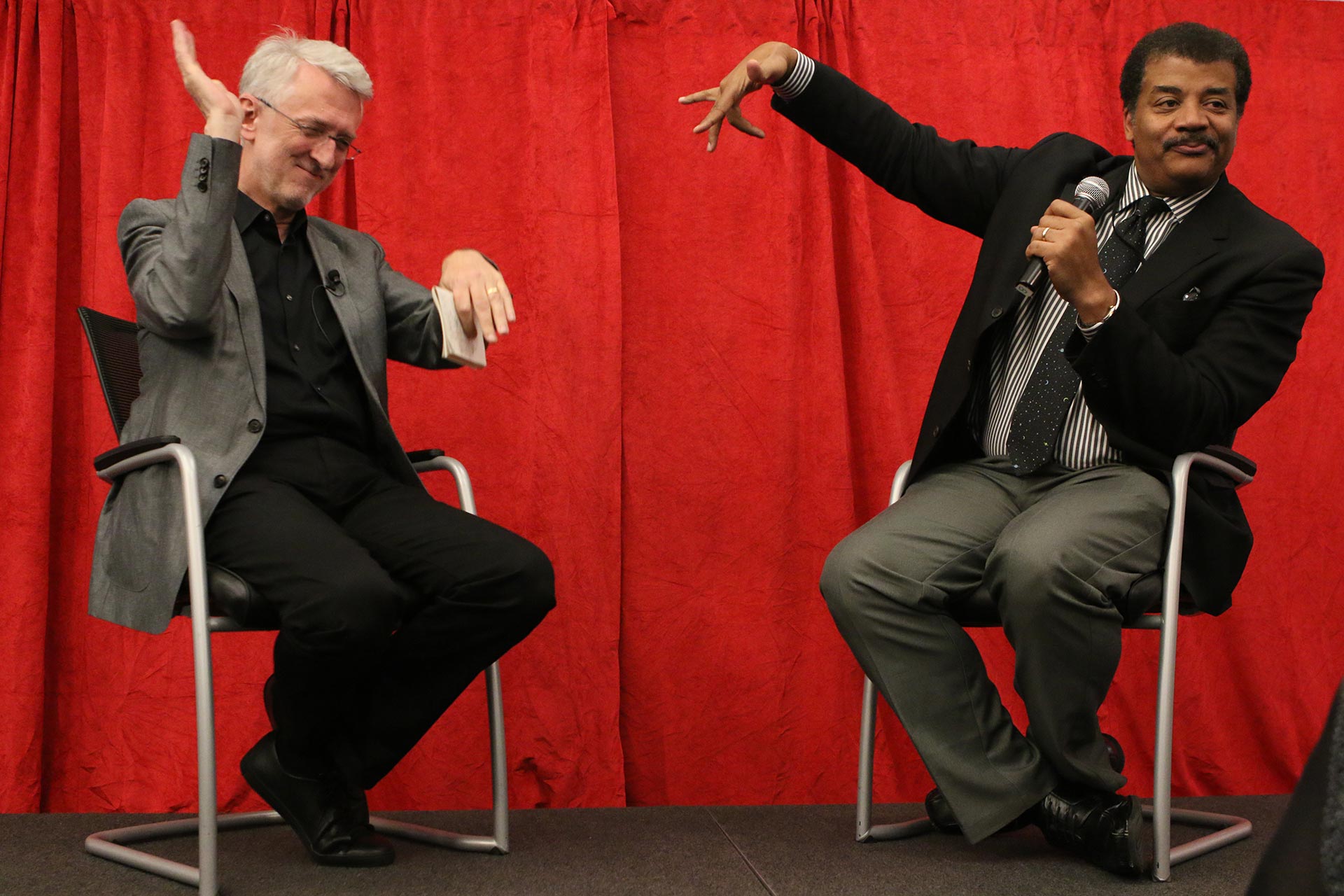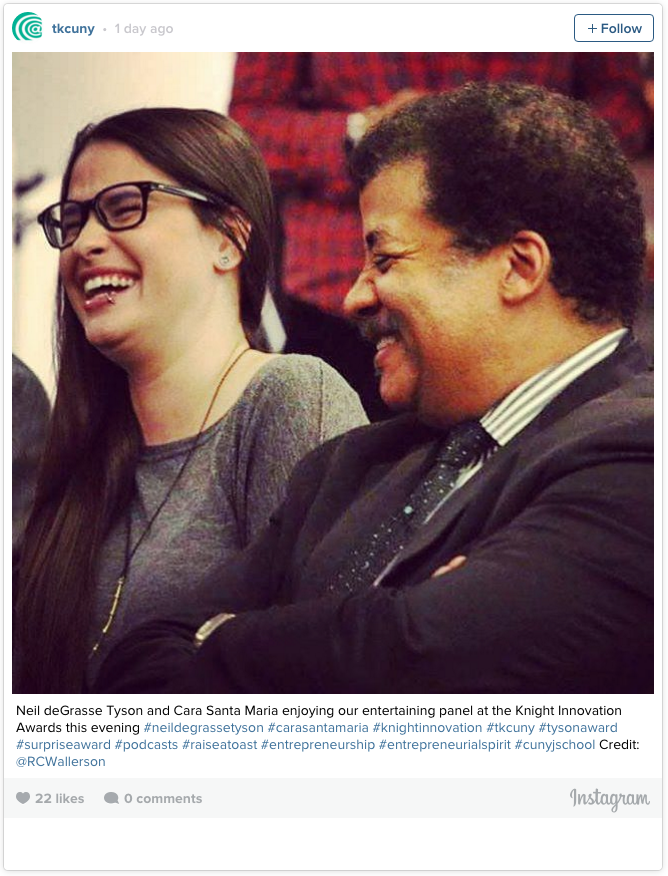
Neil deGrasse Tyson accepts Knight Innovation Award

Knight Innovation Award Winner Neil deGrasse Tyson and CUNY J-School’s Jeff Jarvis Do a Mic Drop. Photo by Ryan Wallerson/CUNY
With his trademark wit and skill at putting high science in lay terms, celebrity astrophysicist Neil deGrasse Tyson, at a New York salute to him and other science information innovators, faulted the news media for largely not knowing enough about science to report it accurately—and for what he sees as the industry’s reluctance to address that shortcoming.
“One-hundred percent of the time I’m journalistically profiled, something is wrong that they don’t know is wrong that could have been corrected instantly. But they thought something else might need to be checked and that’s what they send to me—but not anything else,” said native New Yorker Tyson, director of the Hayden Planetarium at the American Museum of Natural History, podcaster, TV show host and author of several bestselling books.
“What do you care if I read what you wrote [in advance]? … Suppose I do complain? So what … ” asked Tyson, citing journalists’ longstanding tradition of not letting sources review their work before it’s published or broadcast. “If you care about what’s accurate … [do] whatever is required for you make an accurate story… ”
Journalists charged with reporting on science need basic training on what constitutes science, Tyson said, and, as one example, how newly announced research findings still must be proven or disproven with additional research—despite those findings’ publication in a presumably peer-vetted scientific journal.
“One research paper, refereed and published, does not make for a scientific truth,” Tyson said. “Because of this people don’t actually understand how and why science works … You have people hearing, ‘Oh, cholesterol’s good for you this week, bad for you next week, it’s going to be for you in a month,’ thinking scientists have their head up their a–. It’s how you report … The reason the results change each week is because it hasn’t settled out yet. So, don’t report it as truth.”
He, animated and getting louder, caught himself and smiled toward those gathered: “Sorry. I’m screaming. I was calm before that began.”
Caught up in the moment, the audience laughed.
Tyson, host of “NOVAScienceNow” on PBS and the National Science Foundation-funded “Star Talk” podcast, was the main attraction at City University of New York Graduate School of Journalism Wednesday evening, when he received the third annual Knight Innovation Award, hosted by CUNY and funded by Knight Foundation. The award comes with a $25,000 grant for the recipient and $25,000 for the recipient to “give forward” to another innovator.
Tyson, in turn, tapped Southern California-based “Talk Nerdy” podcaster Cara Santa Maria, also an Emmy Award-winning science TV show host and producer and a regular contributor to Al Jazeera’s “TechKnow” for her efforts to make science clearer for a broad public audience.
Santa Maria, who also reports for KCET public television’s “SoCal Connected” and has been among the comedians, actors, recording artists, scientists and others appearing as Tyson’s “Star Talk” guests, has degrees in biology, psychology and journalism. She dropped out of a doctoral program in neuropsychology to teach, cover science news and, in other ways, add to the public conversation on science.
Her work, she said, alternates between straight-ahead journalism and scientific discourse that unreservedly advocates on behalf of science and scientists. Those are two different professional hats, she said, and essential distinctions in a time when lines between traditional, objective newsgathering and advocacy for certain cemented points of view do get blurred.
Podcasting, even by current and former journalists, does not always meet the rigorous standards of detached, objective journalism.
“I try to live in both camps, which can be trying,” said Santa Maria, who started her journalism career writing for the Huffington Post. “Science communication is very different from journalism…
“[Likewise] podcasting is not necessarily journalism; in many cases it is not … Just like we want to maintain an honest difference between science and pseudo-science in the public consciousness… It’s also important to maintain an understanding between journalism and pseudo-journalism and ensure that the public understands that as well.”
For his part, Tyson said he uses everyday tech tools to stir scientific interests among laypeople.
Twitter is one of those tools. And for a few days, he added, laughing, he had more Twitter followers—4.4 million of them—than billionaire Donald Trump and The New Yorker magazine. What he tries not to do on that platform is overlay personal opinion on his tweets about science. To do so, would undermine science itself and, perhaps, dissuade everyday people from asking the very questions about science that might fuel their knowledge of and interests in the field.
And his tweets are pretty simple and singularly aimed: “If human blood were based on copper, instead of iron, turning blood green, instead of red, I wonder what color the stoplight would be.”
That approach is yielding results.
“You’re doing an amazing job … of making science accessible to the people,” Knight Foundation Vice President for Journalism Jennifer Preston said, while introducing Tyson and Jeff Jarvis, the journalist who moderated a question-and-answer with the scientist.
“You are very good at explaining things. You bring facts into the discussion that are badly needed,” said Jarvis, a digital media consultant and director of the Tow-Knight Center for Entrepreneurial Journalism at the grad school.
Altering scientific discussion and making sure regular people are part of it is a work-in-progress, Tyson said.
“One of the problems with science in schools is that we are taught science as subject: There’s history, science, English, Spanish … and then you learn stuff about that subject. That’s not what science is,” Tyson said, answering an audience member’s question about the political stalemate over climate change.
“Science,” he continued, “is a way of querying nature. There need to be classes on what science is and how and why it works. Then you are empowered; you’re inoculated against [someone] throwing a snowball in Congress.”
Katti Gray is a New York-based writer and editor. Follow her on Twitter @KattiGray.
Knight Innovation Award Winner Neil deGrasse Tyson and Give Forward Winner Cara Santa Maria. Credit: CUNY on Instagram.
Recent Content
-
Journalismarticle ·
-
Journalismarticle ·
-
Journalismarticle ·



